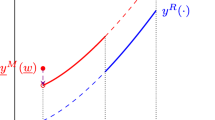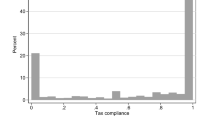Abstract
In this paper we study the strategic aspects of the No-Envy solution for the problem of allocating a finite set of indivisible goods among a group of agents when monetary compensations are possible. In the first part of the paper we consider the case where each agent receives, at most, one indivisible good. We prove that the set of equilibrium allocations of any direct revelation game associated with a subsolution of the No-Envy solution coincides with the set of envy-free allocations for the true preferences. Under manipulation all the subsolutions of the No-Envy solution are equivalent. In the second part of the paper, we allow each agent to receive more than one indivisible good. In this situation the above characterization does not hold any more. We prove that any Equal Income Walrasian allocation for the true preferences can be supported as an equilibrium allocation of any direct revelation game associated with subsolutions of the No-Envy solution, but also non-efficient allocations can be supported.
Similar content being viewed by others
References
Abdulkadiroğlu A, Sönmez T, Ünver MU (2004) Room assignment-rent division: a market approach. Soc Choice Welf 22: 515–538
Alkan A, Demange G, Gale D (1991) Fair allocation of indivisible goods and criteria of justice. Econometrica 63: 1023–1039
Āzacis H (2008) Double implementation in a market for indivisible goods with a price constraint. Games Econ Behav 62: 140–154
Barberà S, Jackson M (1995) Strategy-proof exchange. Econometrica 63: 51–87
Beviá C (1996) Identical preferences lower bound solution and consistency in economies with indivisible goods. Soc Choice Welf 13: 113–126
Beviá C (1998) Fair allocation in a general model with indivisible goods. Rev Econ Des 3: 195–213
Beviá C, Quinzii M, Silva JA (1999) Buying several indivisible goods. Math Soc Sci 37: 1–23
Foley D (1967) Resource allocation and the public sector. Yale Econ Essays 7: 45–98
Fujinaka Y, Sakai T (2007) The manipulability of fair solutions in assignment of an indivisible object with monetary transfers. J Public Econ Theory 9: 993–1011
Henry C (1970) Indivisibilite´ dans une Economie d’Echanges. Econometrica 38(3): 542–558
Hurwicz L (1972) On informationally decentralized systems. In: McGuire CB, Radner R (eds) Decision and organization. North-Holland, Amsterdam, pp 297–336
Hurwicz L (1979) On the interactions between information and incentives in organizations. In: Krippendorf K (eds) communication and control in society. Scientific Publishers, New York, pp 123–147
Moulin H (1990) Fair division under joint ownership: recent results and open questions. Sco Choice Welf 7: 149–170
Otani Y, Sicilian J (1982) Equilibrium allocations of Walrasian preferences games. J Econ Theory 27: 47–68
Roth AE (1984) Misrepresentation and stability in the marriage problem. J Econ Theory 34: 383–387
Svensson LG (1983) Large indivisibles: an analysis with respect to price equilibrium and fairness. Econometrica 51: 939–954
Tadenuma K, Thomson W (1995) Games of fair division. Games Econ Behav 9: 191–204
Thomson W (1979) The equilibrium allocations of Walras and Lindahl manipulation games. University of Minnesota, Center for Economic Research, Discussion paper No. 790-111 (1995)
Thomson W (1984) The manipulability of resource allocation mechanisms. Rev Econ Stud 51(3): 447–460
Thomson W (1987) The vulnerability to manipulate behavior of economic mechanisms design to select equitable and efficient outcomes. In: Groves T, Radner R, Reiter S (eds) Information, incentives and economic mechanisms. University of Minnesota Press, pp 375–396
Thomson W (2007) Fair allocation rules. Rochester Center for economic research working paper no. 539
Zhou L (1991a) Inefficiency of strategy-proof allocation mechanisms in pure exchange economies. Soc Choice Welf 8: 247–254
Zhou L (1991b) Stable matchings and equilibrium outcomes of the Gale–Shapley algorithm for the marriage problem. Econ Lett 36: 25–29
Author information
Authors and Affiliations
Corresponding author
Rights and permissions
About this article
Cite this article
Beviá, C. Manipulation games in economies with indivisible goods. Int J Game Theory 39, 209–222 (2010). https://doi.org/10.1007/s00182-009-0200-7
Accepted:
Published:
Issue Date:
DOI: https://doi.org/10.1007/s00182-009-0200-7




